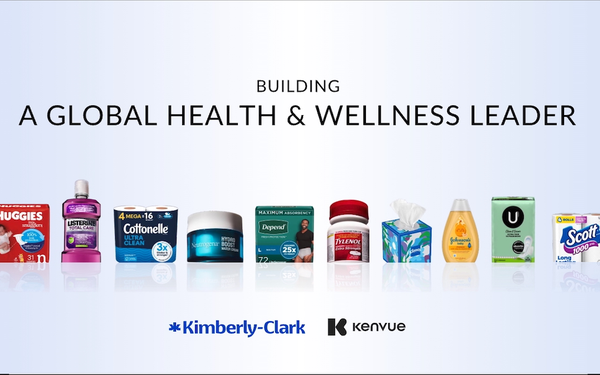
Will Texas Attorney General Ken Paxton
eventually amend his week-old lawsuit against Johnson & Johnson,
Tylenol’s former marketer, and Kenvue, its current marketer, to also include Kimberly-Clark, its future marketer?
That’s certainly a possibility as Kimberly-Clark Monday announced
a surprise deal to acquire Kenvue. The acquisition is expected to close in the second half of 2026.
While Tylenol was barely mentioned during a joint Kimberly-Clark/Kenvue analyst call with
Monday morning, the acetaminophen pain relief brand played prominently in press coverage of the deal. “Kimberly-Clark Agrees to Buy Kenvue, Maker of Tylenol, For $40 Billion” blared a
headline in The New York Times. ”Kimberly-Clark Strikes $40 Billion Deal for Tylenol Maker
Kenvue,” shouted The Wall Street Journal.
“Kimberly-Clark Bets $40 Billion for Kenvue Despite Tylenol Controversy,” declared Reuters.
advertisement
advertisement
The Times described Kenvue as
“embattled,” with the Journal noting that the company “ousted its CEO in July and has been under fire from the White House over unproven claims that Tylenol use during
pregnancy can cause autism in children.”
The Journal also reported "investor concern over the merger,” possibly stemming “in part from Kenvue's potential legal
exposure to hundreds of private lawsuits alleging it hid supposed links between Tylenol and autism or attention deficit hyperactivity disorder in children.”
Officially though, per the
joint analyst call, slide presentation and press release, Tylenol is just one of dozens of brands that will come together to remake now-paper-product-predominant Kimberly-Clark into a $32 billion
company -- second only to $54 billion Procter & Gamble in the CPG arena. Following the merger, Kimberly Clark will take over Kenvue’s mantle as the world’s largest
“pure-play” consumer health company.
Kenvue, which spun off from Johnson & Johnson just two years ago, provided more evidence of its recently declining fortunes – also on
Mondy morning – as it released its Q3 earnings report three days earlier than planned. Sales were down 3.5% year-over-year, to $3.7 billion.
In 2024, Kenvue had $15.5 billion in sales
while Kimberly-Clark reported $17 billion.
Besides Tylenol, the other 10 billion-dollar-plus brands in the combined company’s portfolio are Huggies, U by Kotex, Depend, Kleenex, Scott
and Cottonelle from Kimberly-Clark; and Neutogena, Listerine and Johnson’s from the former Kenvue.
The deal represents “a transformational transaction that will bring
together two iconic American companies to create a global health and wellness leader.” Mike Hsu, Kimberly-Clark chairman and CEO, told analysts. His company celebrated its 150th
birthday three years ago, while Kenvue’s roots as Johnson & Johnson go back 139 years.
Hsu stressed complementary synergies between the two companies in regards to product categories
and audiences, singling out baby care, women’s health and “active aging” as “particular growth opportunities.”
In baby care, he noted, Kimberly-Clark’s
Huggies and Johnson's Baby Shampoo “remind so many parents of when their kids were born.” Brands from the two companies then serve consumers in “every important stage of
life.”
Women’s health brands in the combined entity will include Kenvue’s Motrin and Kimberly-Clark’s Poise, while brands for “active aging” include
Kenvue’s Rogaine and Kimberly-Clark’s Depend
Hsu noted another kind of synergy. Since Kimberly-Clark boasts “high distribution” in several countries like China and
Korea “where people still smoke a lot,” he said he’s excited to be adding Kenvue’s Nicorette to the product lineup.